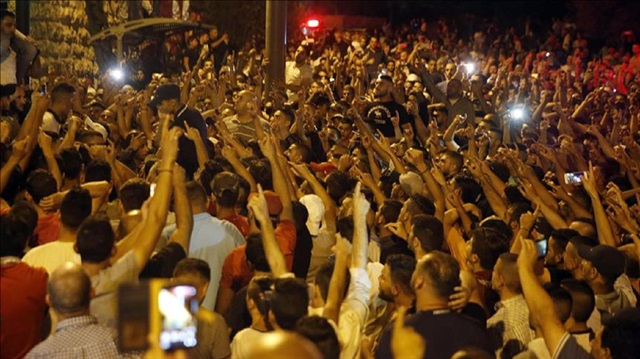
Thousands gathered in the middle of the night to celebrate removal of Israeli iron guardrails at Al-Aqsa Mosque gates
On the road that had been a focal point for more than a week of protests, thousands of Palestinians gathered in the middle of the night to celebrate the apparent removal of recent Israeli security measures near the entrances to Jerusalem's Al-Aqsa Mosque.
As news began to filter through via social media and television of the removal of a metal perch for surveillance cameras and iron guardrails designed to funnel worshippers into several separate lanes, Palestinians from across the occupied East Jerusalem descended on the area below the Old City's Lions' Gate.
The courtyard outside the mosque's entrance, where the protests started in response to the installation of new metal detectors, which had been already removed Tuesday, appeared to have returned to its previous set-up, as the mosque's leadership had previously demanded.
Israel has not yet made any new statements about the removal of remaining security measures but announced early Tuesday that it would be investing 100 million Israeli shekels (about $28 million) on a security system that harnessed "advanced technology."
Senior religious leaders also joined the jubilant crowd, praising their enthusiasm but urging caution, saying no one should enter the mosque for prayers until it was confirmed that all new security measures had been removed.
"The situation is good, god willing, the mosque will be opened," Imam Yusuf Abu Sneinah told Anadolu Agency. "We will pray now on the streets and if god wills it we'll pray the midday prayer inside."
New metal detectors and other restrictive measures were put in place after a July 14 gun attack that killed two Israeli police officers and the three suspects, all Arab-Israelis, who Israeli police claimed had smuggled weapons into the mosque.
The mosque's religious leadership refused to enter the mosque, calling the metal detectors a violation of the "status quo" -- a delicate balance of prayer and visiting rights at the holy site –- and demanding a return to the arrangements before the attack.
Israeli Prime Minister Benjamin Netanyahu stuck by the measures last Thursday, despite potential for clashes between Palestinian youth and Israeli forces after Friday's weekly congregational prayers.
Four Palestinians were killed during clashes on Friday and Saturday and three Israelis during an alleged stabbing attack inside a settlement in the occupied West Bank. Pressure was growing for a solution before another Friday of prayers in Jerusalem's streets, rather than the mosque.
While Palestinian youths set off celebratory fireworks and formed circles of song and dance, a group of East Jerusalem women said they were happy the crisis seemed to be easing and confident they would be able to enter Al-Aqsa on Thursday.
"Every revolution starts from the people, not the government. You can call this a revolution," Adnan, a 58-year-old driver from the Wadi Joz area, told Anadolu Agency. "It's even a revolution against the Arab governments."
He said he had never seen so many Palestinians join together to celebrate so vociferously in the middle of the night.
"Netanyahu made everyone united. People realized they missed something when they closed the mosque, even those who don't pray."
Prayer and entry rights to the holy site are sensitive because of Israel's control over Jerusalem's Old City as well as the site's importance to Jews, who call it the Temple Mount.
Many Palestinians felt the security measures installed at the sites entrances encroached on their freedom to worship and were an attempt to change the "status quo" on the site.
Since the metal detectors were removed early Tuesday, Jerusalem's Islamic authorities have been urging people not to enter until they assessed the changes made to the security set-up around the mosque -- a request they repeated on Thursday's early hours despite the victorious atmosphere.





